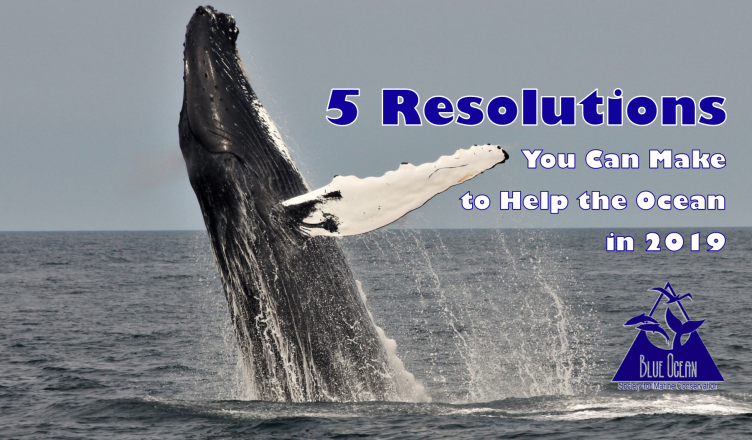New Year’s Day is quickly approaching, and what better way to celebrate than with a resolution to protect the ocean in 2019? Check out some of my resolution ideas below or create your own!
1. Skip the Straw & Other Single-Use Plastics
Skipping the straw was big news in 2018, and if you haven’t already committed to this effort for the ocean, 2019 is the perfect time to do so! Plastic straws are an issue because they are extremely difficult to recycle, resulting in many straws sent straight to landfills where they will never biodegrade. Many single-use straws also end up on beaches and in the ocean where they can harm marine life such as sea turtles and birds. In 2016 alone, Blue Ocean Society volunteers picked up more than 1,700 straws at their beach cleanups. With the rise in #SkiptheStraw awareness has come a multitude of plastic straw alternatives, including stainless steel straws, foldable metal straws, bamboo straws, paper straws, and silicone straws. When you do skip the straw or bring your own reusable one, spread the word! Share with us by taking a photo and tagging us on Facebook, Twitter or Instagram with the hashtag #SkiptheStraw. While stocking up on reusable straws, remember that every use of your reusable alternatives for plastic bags, water bottles, coffee cups, and takeout containers also help the ocean!
2. Dedicate Time to Cleaning the Beach
With 200+ beach cleanups per year, Blue Ocean Society has removed over 184,000 pounds of litter from our local beaches since 2001 with the help of volunteers like you! Common items found on beaches in New Hampshire, northern Massachusetts, and southern Maine include cigarette butts, plastic fragments, foam, rope and fishing gear, and wrappers. You can help us keep these beaches clean in 2019 by joining us for our monthly cleanups at Jenness Beach in Rye, NH. These cleanups happen every second Saturday of each month, with the first one of the year scheduled for January 12, 2019 at 10:30am (see our calendar here for future dates). In between cleanups, or if you’re located out of the area, you can help the ocean by making a resolution to pick up litter wherever you are! Every piece of trash that we pick up on the street, in the park, or on the sidewalk is another piece of trash that will not end up in the ocean.
3. Reduce Microplastic Pollution
In addition to reducing marine debris by choosing reusable alternatives to plastic and joining beach cleanups, you can help the ocean in the new year with a resolution to reduce your microplastic pollution! Microplastics are pieces of plastic smaller than 5mm that are either the result of the fragmentation of larger plastics or components of products made intentionally small, such as microbeads in some beauty products. These microplastics harm marine life when ingested and can accumulate in the tissues of living creatures, including fish that we eat (learn more about microplastics in our blog post here). By choosing reusables and recycling, you can help prevent the large plastics that will break down into microplastics from entering the environment. You can upgrade this resolution by also reducing your microfiber pollution from home by simply improving your laundry habits. Microfibers are a form of microplastic that mainly result from the shedding of synthetic clothing during wear and laundering. These microfibers are small enough to enter our wastewater and then the ocean through typical washer and dryer systems. You can help reduce microfiber pollution by choosing natural fibers for your clothing whenever possible, and by using a filtering system such as the Cora Ball when washing synthetic fabrics.
4. Reexamine Your Carbon Footprint
If you haven’t thought about your carbon footprint in a while, the new year is a great time to reexamine your energy usage, travel habits, and modes of transportation through a carbon footprint calculator (use the EPA’s calculator here). Reevaluating these essential components of your routine can help you see where you’ve improved in the last year and where there is room for growth in 2019. You can help the ocean in the coming year by making a resolution to reduce your carbon emissions, and there are many ways to do so: consider switching to a sustainable source of electricity such as solar or wind power, limiting your long-distance flights, and using energy-efficient transportation whenever possible. Reducing carbon emissions on a global scale is key to mitigating the effects of climate change on the ocean, and these are just a few examples of the ways your resolution can help.
5. Commit to Enjoying the Beauty of Nature
With so many ways to protect the ocean in your everyday life, why not also resolve to enjoy its beauty more often in 2019? In addition to joining us at the beach for monthly cleanups, you can also learn about wildlife in the Gulf of Maine with Blue Ocean Society naturalists on our whale watches out of Rye, NH and Gloucester, MA! The whale watching season will start up again in mid-May and runs through late October. Some wildlife you might see on a whale watch include humpback whales, fin whales, minke whales, Atlantic white-sided dolphins, and harbor seals. Learn more about how to book your seat aboard a whale watch here. Your day out on the water with us supports Blue Ocean Society’s whale research program, in which our naturalists and interns identify and catalog local fin and humpback whale populations. During the summer season, you can also visit our Blue Ocean Discovery Center in Hampton Beach, NH, where you can learn about (and touch) local tidepool creatures!
BONUS: Become a Volunteer!
If you’d like to take your resolutions for the ocean to the next level, consider volunteering with Blue Ocean Society! We are currently recruiting volunteers to assist with beach cleanups, school programs, special events, microplastics research, and at the Blue Ocean Discovery Center. Submit a volunteer application here or contact the Volunteer Coordinator, Katie, with any questions at katie@blueoceansociety.org!







Hi Jen,
Thanks for sharing your ideas. I always learn something new when I read your posts!
Thanks for reading, Sue! Thanks to our Programs Coordinator Katie for writing this post!
Great information and ideas – thanks for the reminder about carbon footprint – you’re right – I haven’t thought of it in awhile! I like the EPA calculator : )
Pat, thanks for your feedback! Happy New Year!